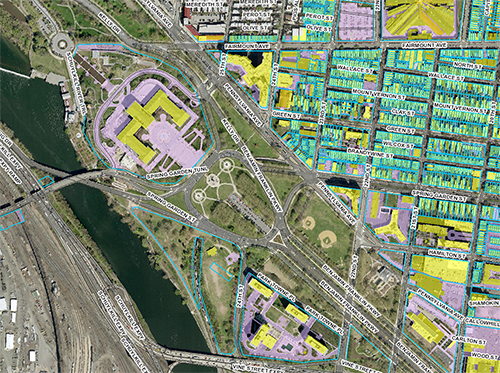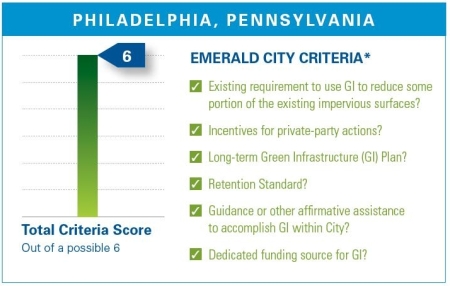Humans rely on natural resources and benefit from healthy ecosystems in countless ways—these benefits are called ecosystem services. We have known about the intrinsic value of ecosystem services for a long time, but have been slow to put a dollar amount on that value, largely because it’s difficult to calculate—how do you calculate the financial benefit of clean air?—and because the free market economy developed when natural resources were seemingly endless. In Jonathan Lerner’s Nature’s Salary, from the July issue of Landscape Architecture Magazine, he discusses the concept of payment for ecosystem services (PES), as the “next big thing in conservation,” and cites Philadelphia’s Green City, Clean Waters plan as one of two case studies that use PES as an innovative, market-based approach to sustainable resource management.
The 25 year Green City, Clean Waters plan aims to mitigate stormwater runoff and reduce Philadelphia’s Combined Sewer Overflow by 85% using green stormwater infrastructure that mimics nature, soaking up stormwater with trees, plants and soil. To get private property owners on board with the plan, the PWD applies a payment for ecosystem services approach to stormwater billing, essentially turning water into a commodity. Customers are billed based on the ratio of the total area of the parcel to its impervious area; the more paved, hard surfaces a landowner has, the higher the bill. This PES approach creates a rebate for customers who install green stormwater infrastructure on private land.
Another PES approach cited in Lerner’s article is payment to customers who help mitigate stormwater runoff, instead of billing for the mitigation efforts provided by the municipality. The South Florida Management District’s Dispersed Water Management Plan pays cattle ranchers and other farmers to develop surface storage on their land, reducing the need for expensive measures like building dams or underground storage tanks.
These new PES approaches change the way people relate to their water system and have great promise to be successful role models across the nation. Read more about the payment for ecosystem services concept and the different approaches being used around the country to change our economic and ecological paradigm.



